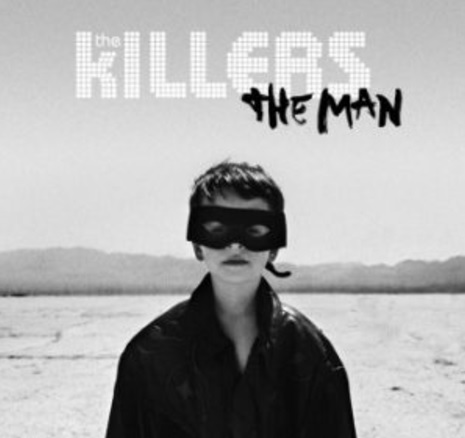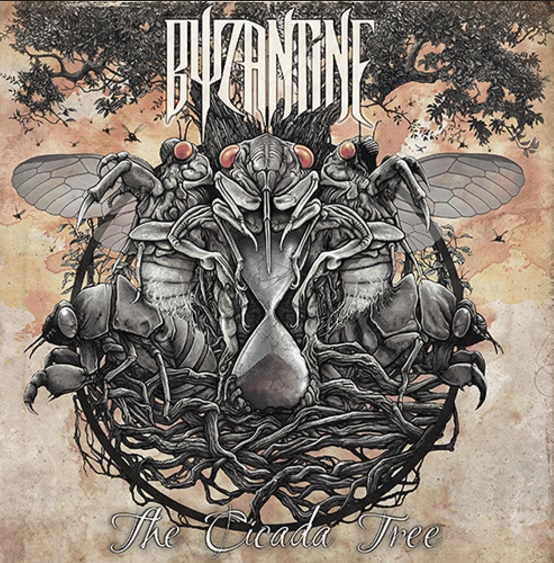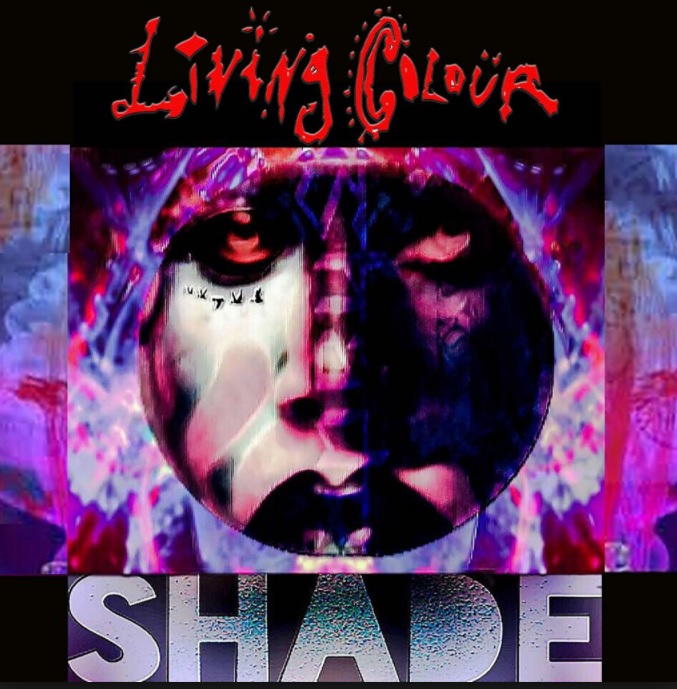You only half-shitting on me – semi-colon.
Thirty Seconds To Mars | “Walk On Water”
Jared Leto loves two things: majestic arrangements and Tony Robbins platitutes,. That is made painfully clear (again) on “Walk On Water”. Leto writes choruses designed to be shouted back to him by the masses, and this does not fail that goal. Whether Leto trying to sell self-help (“Do you believe that you can walk on water?/ Do you believe that you can win this fight tonight?”) is supposed to empower the audience or the other way around remains unclear. This will be stuck in your head after a one listen, so choose wisely.
Interview: Fibonacci Sequence
I did an interview with Milwaukee locals Fibonacci Sequence for Milwaukee Record. They do instrumental prog, and they are really nice guys.
To enter the world of Milwaukee’s Fibonacci Sequence is to enter a world whose backstory includes two Chads (“Chad 1” and “Chad 2”), a producer/musician named Chris Kringel, and a current bass player being confused for a different bass player named Dave Burkowitz (no, not that one).
The unconventional project is a progressive instrumental band founded in 2006 by guitarist Mike Butzen, keyboardist Jeff Schuelke, and drummer Tom Ford. After releasing the We Three Kings EP in 2009 and their debut LP Numerology the following year with Kringle on bass as a guest, the band added bassist Chad Novell in 2011 to round out the official lineup.
An astute listener will pick up several progressive influences. Some are obvious (Genesis, Pink Floyd), some are not (Boston, Phish). The most common sonic touchstone and most frequent comparison is Liquid Tension Experiment, the instrumental metal project from members of Dream Theater.
Fibonacci Sequence doesn’t get sick of being compared to other bands, though. In fact, they say they even see it in a positive light. “At least we’re getting attention,” Ford says. Novell has an even more optimistic outlook. “I don’t ever get sick of comparisons,” he says. “I think the worst part is, people don’t know what to compare us to. A lot of times, the only reason that we get compared to LTE is because there’s not a lot of other instrumental groups out there. But if you wanna compare me to those guys, okay. That’s a huge compliment.”
But however you want to describe it, Fibonacci Sequence’s music is certainly their own. Numerology is an hour-plus journey during which you’ll discover both their songwriting talents and their sense of humor. The band members are self-aware enough to know who they are, that what they do can be seen as pretentious, and that multi-part instrumentals don’t exactly blow up on the radio.
“It gives us a great niche—instrumental prog,” Ford says. “The chicks just love it.” But he’s also quick to point out that instrumental music gives them an added challenge as composers. “If you look at songs with lyrics, the lyrics build and change and the band can repeat the same theme behind it,” he says. “We always have to advance musically.”
As for why they’re an instrumental band, it’s quite simple. “I think it just evolved through the music,” Ford says. Outside of the band, Ford is a songwriter and lyricist himself, but he concedes that “this music just did not speak to me lyrically.”
Beyond that, the music is certainly challenging enough, both for the listeners and the musicians involved. “I wouldn’t wanna try to write lyrics or vocal melodies over this stuff,” Novell says.
“That might be why we are a little bit more cinematic in terms of music,” Ford explains. “I’ve always told people when they ask us to describe what we do that it sounds like movements of an orchestra or a soundtrack, that kind of thing.”
Fittingly, their upcoming sophomore LP, Cinema Finis, was inspired by the band’s love of cinema. “One night, me and Mike [Butzen] were texting back and forth trying to figure out a better concept because music was already coming,” Ford says. “Somehow the conversation steered towards the word ‘cinema’ and then, it just popped in my head. What about a theater that shows a film where your life flashes before your eyes?”
There’s a literary component, as well. Schuelke is the author of the accompanying story, the first three parts of which are on the band’s website. The tale, called Encore: A Cinema Finis Story, tells of a theater manager who’s about to lose his business until a mysterious benefactor offers to save it from financial ruin, on the condition that the manager allow the benefactor and his partners to renovate the theater in order to show a special film.
The story doubles as Schuelke’s own social commentary of sorts. “One reason movie theaters are going under is because people are Netflix-ing or torrenting,” he says. “They don’t go to the theater anymore. So this is my love letter to days gone by, when we all sat around a turntable and listened together. The theater represents that.”
As with progressive music, the band takes its time with writing and recording. “If you watch the campaign video [for Cinema Finis], I had to edit it because it says the album will be coming out in 2015,” Schuelke says. “That’s how long this process has been.” Following the record is a documentary chronicling the album’s making. “It’s coming out hopefully in January, which probably means June,” Schuelke says.
Album Review: ‘Singles: OST’
I discussed the reissue of the soundtrack of the grunge era, Singles: OST.
The soundtrack is better than the movie. A quarter century later, this is true of the Singles: Original Motion Picture Soundtrack. This is no fault of the movie, which is a fine rom-com; but while the movie may have left little resonance in its wake, its great music lives on, a mix-tape of the early ‘90s that sends you back to another time. Sequencing and song choices complement each other perfectly, and its various artists didn’t just throw leftovers at quick product: there are songs here that rank among the artists’ finest. Singles: OST is also a nearly perfect primer on and microcosm of the grunge/alt-rock scene that was then nearing inescapable cultural phenomenon status (so much so that a rom-com was made around it). Indeed, as artists on its roster were going platinum, so too did the soundtrack. Think of it as Alt Rock for Dummies.
But if you were or are a fan of grunge and/or alternative rock, you knew all of this already. Discussing the solo of Smashing Pumpkins’ “Drown” and how it’s the best and worst of the band’s career, or arguing that Pearl Jam’s “Breath” would’ve made Ten an even better record is stuff for a 25th anniversary column.
We’re talking about Singles today because of the deluxe edition’s bonus disc, more than a third of which is previously unreleased material that’s not just vault-clearing fluff. Much of what’s offered further solidifies the album as the best point of entry into early 90’s rock. Demo and alternate versions of songs from the original release, coupled with the inclusion of obscure and/or defunct bands from the Sub Pop roster (i.e., short-lived grunge acts Truly and Blood Circus), alone makes this a must for fans.
Paul Westerberg’s jangle-grunge gem “Dyslexic Heart,” for example, perhaps the ex-Replacement’s finest solo moment, takes on two different forms. There’s a campfire-like acoustic take and a folky instrumental called “Blue Heart.” The former removes all the “na-na-na-na”’s (except for the bridge), adding greater emphasis to its low-key pop melody and clever, heartfelt lyrics, while the latter demonstrates that Westerberg’s songwriting easily translates between genres.
Elsewhere, the fantastic Alice in Chains live performances from the film (“Would?” and “It Ain’t Like That”) finally get a CD release, as does Soundgarden’s performance of “Birth Ritual”. Having both studio and live versions of these songs available is a joy and proves just how powerful these two bands were in either setting.
If there is inessential material here, it’s Mike McCready’s swampy “Singles Blues 1” and the “score acoustic” version of Westerberg’s “Waiting for Somebody”. While the former is a fun, two-minute instrumental jam, it’s largely a curio that really only warrants a couple listens. The latter, meanwhile, is only worth hearing if you enjoy Westerberg’s other superb track whittled down to the “Some-bod-a-hay” line on loop.
The reissue of Singles: OST arrived one day after Chris Cornell’s death, leaving an unfortunate shadow looming over it. While unintended, the soundtrack does provide an epitaph, if only because he appears across its two discs more than any other artist. This includes the final two songs of the collection, “Ferry Boat #3” and the instrumental “Score Piece #4”. Both are cautiously optimistic, yet in light of the details surrounding Cornell’s death it’s tempting to read into the final words of the collection: “And when you wake to your loss/ To blame your dreams won’t relieve you of the cost/ Help me, I don’t know what I’m doing.” It’s semi-inspirational as Cornell reassures the listener with variations on the ‘not all who wander are lost’ theme. It works both as a farewell to the greatest vocalist of the grunge era and a fitting end to the soundtrack that defined a generation.
Album review: Suffocation | ‘…Of the Dark Light’
I reviewed the new Suffocation album, …Of the Dark Light, for Spectrum Culture.
Since reforming in 2002 after a four-year breakup, Suffocation’s output has been promising, if a bit spotty. The quality of the band’s albums trends upward, yes, but it starts at a fairly shallow point. Their records go from the band awkwardly finding its footing (2004’s Souls to Deny), to slowing the pace down for improved results (2006’s self-titled LP and 2009’s Blood Oath), to making one hell of an impressive display of sheer aggression a quarter-century into its existence (2013’s Pinnacle of Bedlam).
Bedlam is easily Suffocation’s best offering since 2002, and among the best in their career. Yet, if there is a flaw to be found within it, it’s the same flaw that has plagued much of the band’s catalogue: too often the band mistakes mindless jackhammering and apathetic brutality for songwriting. Sure, blast beats and endless riffing are cool and easy to headbang to, but the slope of diminishing returns is steep. The closest they came to shedding it was Oath, a record that shifted the focus from headlong sprints to groove-based compositions but suffered the same issue regardless.
Sadly, the band hasn’t fully shed that tendency on their new record, the often brilliant …Of the Dark Light. While breakneck jackhammering is still prevalent throughout (especially on “Return to the Abyss,” “The Violation” and “Some Things Should Be Left Alone”), the songwriting is more varied than Bedlam. In this way, Light appears to borrow ideas from its two predecessors and combine the results. As an example, “The Warmth Within the Dark” is mostly a mid-tempo stomp (with bursts of speed that equals anything they’ve done) with a main riff during the quasi-chorus that has a slightly uplifting feel and is even catchy.
But Suffocation knows when to borrow from other bands to break up the monotony, too. Immolation, a fellow New York death metal institution, seems to be a source of inspiration on the opening of the punishing “Your Last Breaths” and the psychotic title track with their eerie leadwork over frenzied guitar crunch. Notably, the title track also slows down as it progresses – mimicking the passing of time in the lyrics – making it one of the few truly different compositions offered.
And then there are times when pummeling concrete does serve a purpose. “Some Things” illustrates this the best. It’s a sci-fi horror scene that finds some innocent strangers encountering a creature from another dimension that kills them purely for “wrong place, wrong time”. The song’s lyrics paint a grisly picture (“Spines snapped/Heads cracked/Carnage ensues”) as flailing riffs and light-speed drumming attempt to match said carnage. The song ends with vocalist Frank Mullen stating that the unlucky person(s) to stumble onto this “scene of malevolence shall be forever scarred” which is then followed by a delirious solo from lead guitarist Terrance Hobbs, as if to imagine the thoughts of the unlucky.
In keeping with a tradition dating back to 1995’s Pierced from Within, Suffocation ends …Of the Dark Light with a re-recorded track from 1993’s Breeding the Spawn. This time around it’s the fantastic “Epitaph of the Credulous,” riff-fest that describes a winged creature searching for “helpless victims” to feast upon. Mullen notes that, “The beast has no feelings/ It sees no remorse”, which is an apt description of the band itself. Suffocation begins its fourth decade next year, and there are no signs that this beast can be stopped.
Album review: Arcadea | ‘Arcadea’
I wrote about Brann Dailor’s latest project, Arcadea, for Spectrum Culture.
For his new project, Arcadea, Mastodon’s vocalist and drummer Brann Dailor joins forces with two keyboardists and vocalists, Core Atoms of psychedelic weirdos Zruda and Raheem Amlani of black metal experimentalists Withered. The trio’s self-titled debut is a concept album that the band has described as envisioning “a future five billion years from now, where the impending collision of galaxies creates a new order of planets…where cold, distant moons pledge alliance to new suns and expanding gas giants implode into black holes” and where “Arcadea reign supreme as the last surviving space wizards since the final extinction.”
It is within this context that you begin to understand what Arcadea is: namely, a frontrunner for oddest album of 2017 and the silliest thing Dailor has ever been a part of—and keep in mind that Mastodon once made a record about a child’s soul traveling into the body of Grigori Rasputin via astral projection who tries and fails to overthrow a Russian czar…or something.
If the explanation of the record’s content isn’t ridiculous enough, simply refer to the lyrics. When the vocalists aren’t busy singing in the first person as a group of electrons (“We spin freely/ We breed orbit/ Velocity/ We crash to ignite, we are electric”), they’re trying to sell absurdist word salad (“Crystals that form on the outside of life/ Lifeless the seas that have sent them in waves/ Perfect destruction, we’re floating away/ Swim through the static, the ocean alive”) and cosmic beat poetry (“Push past the pulsar phantoms with future kind/ Erase, replace, deface, create the space”).
The assumption, then, is that it’s better to focus on the music and melodies, right? Well, mostly. The darting, nimble melody of “Gas Giant” and the ethereal vocals of Susanne Gibboney’s guest spot on “Neptune Moons” suggest as much. Hell, the vocoder-heavy vocal melody of “Through the Eye of Pisces” sounds like the first draft of a Daft Punk song, and “Motion of Planets” has an actual groove. The majority of the album, however, imagines oddball scenarios like electro-funk having an epileptic seizure or a pinball machine doing an impression of an Atari 2600. Keyboards and synthesizers pulse, twinkle, fizz, bubble, jab and stutter, yet to accurately describe this record is to traverse dangerously close to Dr. Seuss territory with onomatopoeic non-words like “skwonk,” “squink” and “twonk.”
Either way, Dailor’s drumming throughout demonstrates his unwavering faith in the proceedings. His effort to break up the wall of bong-ready keyboards and synths via his insistent jazz-style playing is both Herculean and Sisyphean in equal measure. Even on subdued compositions “Neptune Moons” and “Through the Eye of Pisces,” where he largely acts as time-keeper, Dailor can’t help but let a few fills seep out as if to imply the songs weren’t interesting enough as is.
Still, the record is not a total loss. Sure, there’s undeniable, right-brain creativity here, like when the keyboards in the left and right channels have a ray-gun fight (“The Pull of Invisible Strings”) or when the band attempts to soundtrack electrons colliding (“Army of Electrons”). Even the jam session that closes the record is loosey-goosey fun. But, it’s that esoteric nature which ultimately becomes Arcadea’s downfall. Weirdness is good in art, maybe even essential. When weirdness goes unchecked, though, it tends to suck away good ideas into oblivion—kinda like a black hole.
Queens of the Stone Age | “The Way You Used To Do”
In which the band’s trademark robo-rawk is supplanted for robo-groove, likely thanks to the “Uptown Funk” guy, who produced the upcoming LP. (Not that it’s a surprise, but there’s a strong dance element to this – including handclaps and a flippantly sashaying guitar riff). Perhaps fittingly, Josh Homme wrote about his favorite topic (read: fucking) to match the artificial sexiness of the whole affair. Basically, imagine the next logical step after Era Vulgaris but with Mark Ronson calling the shots.
The Killers | “The Man”
“The Man” has a fun enough strut to it, despite being borrowed nostalgia faux-disco. Meanwhile, Brandon Flowers continues to believe he sell anything through sheer willpower, even tongue-in-cheek machismo like, “‘Cause, baby, I’m gifted/ You see what I mean?/ USDA-certified lean”. Meh, call it a wash.
Byzantine | “Trapjaw”
Second single from The Cicada Tree is gnarly, vicious, and catchy. In other words, it’s a Byzantine song – and a solid one at that. The pedestrian lyrics (“You trade the here and now for everlasting lies/ Just a barrier to divide those side by side/ They seek to define”) follow a well-worn path, but that’s about the track’s only downside. More of this, please.




